- Home
- Ben Counter
Seventh Retribution
Seventh Retribution Read online
Table of Contents
Cover
Title Page
Warhammer 40,000
Prologue
K-Day –12 Hours
K-Day –10 hours
K-Day –8 Hours
K-Day, K-Hour
K-Day +2 Days
K-Day +4 Days
K-Day +7 Days
K-Day +11 Days
K-Day +11 Days
K-Day +11 Days
K-Day +11 Days
K-Day +11 Days
K-Day +13 Days
K-Day +15 Days
K-Day +15 Days
K-Day +15 Days
K-Day +17 Days
K-Day +18 Days
K-Day +34 Days
About The Author
Legal
eBook license
It is the 41st millennium. For more than a hundred centuries the Emperor has sat immobile on the Golden Throne of Earth. He is the master of mankind by the will of the gods, and master of a million worlds by the might of his inexhaustible armies. He is a rotting carcass writhing invisibly with power from the Dark Age of Technology. He is the Carrion Lord of the Imperium for whom a thousand souls are sacrificed every day, so that he may never truly die.
Yet even in his deathless state, the Emperor continues his eternal vigilance. Mighty battlefleets cross the daemon-infested miasma of the warp, the only route between distant stars, their way lit by the Astronomican, the psychic manifestation of the Emperor’s will. Vast armies give battle in His name on uncounted worlds. Greatest amongst his soldiers are the Adeptus Astartes, the Space Marines, bio-engineered super-warriors. Their comrades in arms are legion: the Imperial Guard and countless Planetary Defence Forces, the ever-vigilant Inquisition and the tech-priests of the Adeptus Mechanicus to name only a few. But for all their multitudes, they are barely enough to hold off the ever present threat from aliens, heretics, mutants - and worse.
To be a man in such times is to be one amongst untold billions. It is to live in the cruellest and most bloody regime imaginable. These are the tales of those times. Forget the power of technology and science, for so much has been forgotten, never to be re-learned. Forget the promise of progress and understanding, for in the grim dark future there is only war. There is no peace amongst the stars, only an eternity of carnage and slaughter, and the laughter of thirsting gods.
Prologue
K-Day –550 Days
The Kekropian Persecution
Upon the first day, it was traditional for the peasantry of Opis to take upon themselves the sins of their betters, and so absolve the planet’s aristocracy of their wrongdoings. This would make the nobles of the Aristeia fit to hold the great feasts and festivals to come.
The first day of the festival season, then, was a day of great pain and bloodletting, for the sins of the Aristeia were many. The Aristeia traced their bloodlines back to the signatories of the charter that decreed Opis a vassal of the Imperium, an event that went back almost ten thousand years. That was plenty of time for the countless bloodlines of the Aristeia to spawn murderers, heretics, madmen and tyrants, and all those sins had to be cleansed every year before thanks could be given to the Emperor and those appointed to rule in His stead. Every single peasant had to do penance. Some opened last year’s scars with scourges or bleeding-irons. Others had already fasted for many days. The infirm and elderly were permitted simply to donate a portion of their blood.
In the planet’s second city, the vast and many-layered sprawl of Makoshaam, this penance was traditionally performed on one of the thoroughfares that were reserved on all other days for members of the Aristeia. The younger daughters of the aristocracy went among the penitents here, binding wounds with silken bandages or administering pain-relieving draughts from silver ewers carried by their servants. Even so, many of the more extreme penitents, who let life-threatening amounts of blood or severed body parts, were crippled or killed by their exertions.
This scene, which mingled celebration and suffering, was repeated throughout Makoshaam. It was particularly obvious along the Manticore Gate Processional, the route from the city outskirts to the Basilica of the Thousand Wounds, a wide avenue paved with slabs of polished decorative stone and lined with sculpted reliefs. A small army of household menials had been despatched to mop up the penitents’ blood almost as soon as it was spilt, and the younger daughters moved among the penitent throng wearing heavy white gowns and veils treated with germicide. One member of a peasant household might be nailed to a wall by his wife and children, while another might be tied to a post and whipped by a sibling, who wept every time the lash landed home. Some of the Aristeia emerged from their fortified manors to watch, but most did not, for it did not do to encourage the self-importance of the peasantry by acknowledging their devotions.
The sounds were a dismal mixture of the groans of the pained and the thuds of cudgels and whips on flesh. The smell was of blood and sweat mixed with the everyday spice and aromas of Makoshaam.
Into this scene came a strange band of newcomers. The penitents paused in their self-mutilation and the younger daughters of their betters shied away, seeking the comfort and safety of the household servants who accompanied and guarded them. The strangers were not only from beyond the city – they did not wear the long, white garments of the Aristeia or the grey overalls of the peasants, or the dyed trains that denoted rank. They were like nothing that had been seen on Opis itself since the last time the Emperor’s tithe-takers had descended thirty years before. And where the tithing mission had been grim and monastic, dressed in black habits and carrying golden icons of the Imperial creed, these strangers were a colourful and fearsome band without uniform or badge of allegiance. Most of them were armed to the teeth, with an armoured monster as a leader.
This man – for there was presumably a man inside the crimson armour, beneath the torches burning on his shoulder guards and collar – did not acknowledge even the patriarchs of the Aristeia who emerged from their manors to demand to know his business. Anyone who tried to bar his way was pushed aside by those who accompanied the armoured giant, with shields or the points of chainswords. He strode all the way to the Basilica of the Thousand Wounds, and when he passed into the shadow of the gilded minarets a crowd had gathered around the basilica gate just to see the man who so flouted every convention of Opis’s society.
The armoured man stood at the gates, with their silver sculptures of the many Imperial saints venerated within. He slammed an armoured fist into the doors three times. The doors were hauled open a crack by some unfortunate lackey.
‘I will speak with the Aristeia,’ said the armoured giant. ‘Their representative in this place will receive me. I command this by the authority of the Holy Ordos of the Emperor’s Inquisition.’
The doors were closed in his face as those inside, who numbered the most senior patriarchs and matriarchs of Makoshaam, dithered about what was to be done and which one of them would step forth to speak for them. The armoured giant, who had claimed the authority of the Emperor’s Inquisition, became impatient and barked a few orders to the band who accompanied him. One of them, who wore medals and honours from many Imperial Guard campaigns, stepped forward and took a plasma gun from the soldier’s pack on his back. With no ceremony, he blew the hinges off the doors. They toppled forward with a terrific sound which scattered many of the crowd who had crept up to get a closer look at these strange people.
The armoured man walked into the Basilica of the Thousand Wounds, taking barely a moment to genuflect at the threshold in honour of the Imperial saints whose martyrdoms had given the place its name.
‘I am Lord Inquisitor Kekrops, and I bring with me the authority of the Emperor Himself as devolved upon the Ordos of His Inquisition.’ Kek
rops stood in the debating chamber of the basilica, his warband gathered behind him. Before him were rather more than two hundred members of Opis’s aristocracy, dressed in flowing floor-length silks with turbans and veils of every colour. ‘It matters little to me which one of you speaks for your city, but one of you will.’
Silence met him. Eyes passed from the inquisitor to the warband assembled behind him. The inquisitor alone was an impressive enough sight. His armour was polished red inlaid with gold filigree, and it seemed impossible that anyone could walk encased in such a splendid, but surely vastly heavy, personal fortress. The torches mounted on it burned with gas fed from bottles mounted on his back, where also was held in a scabbard a sword rather longer than most men were tall. The inquisitor’s face was that of an old man, but somehow seemed no weaker for all its age. It was as if the deep lines and grey hair suggested the things he had done just to survive this long.
His warband were no less exotic. One of them was a tall and slender woman with plaited hair down to her waist, wearing a sleeveless, backless gown of emerald green that would have created a scandal in the salons of the Aristeia. She carried an enormous book with brass covers chained shut, and around her hovered a pair of skulls with lenses fixed over the eye sockets. Several of the warband, including the man carrying the still-smouldering plasma gun, were from the Imperial Guard, but the similarity between them ended there for they each wore the uniform of a different regiment (in many cases, pieces taken from several regiments). One of them carried a banner pole with a standard, presumably the colours of Inquisitor Kekrops, furled around it. Another of the inquisitor’s acolytes was a skeleton of a man whose black hooded habit could not hide his lack of substance, or the band of embroidered cloth around his eyes.
One of the Aristeia, after much searching for another speaker among the faces of his fellow aristocrats, raised a hand.
‘The masters of this world,’ he said, ‘reside in Khezal.’ He was younger than most of the dignitaries, and he wore fat, uncut gemstones on a silver chain around his neck. ‘They carry the greatest authority among us. I have no doubt that…’
‘I am not in Khezal,’ replied Kekrops shortly. ‘I shall visit every city of this world, and I shall reach the capital in good time, but this day I am in Makoshaam. I hold this city to account for its wrongs, and you to account as those who claim to rule it.’
‘Then I shall speak,’ said the nobleman. He swallowed and drew himself up a little, as if about to deliver a speech. Kekrops did not look impressed. ‘I am Eshrahem Wrathful Mountain, Third Lord of the Amethyst Court. I have as much right as any to speak in this chamber for the interests of my city.’
Inquisitor Kekrops snapped his fingers and one of his troopers, who wore a fanciful brocade dress jacket over a pair of threadbare camouflage trousers, handed him a roll of parchment. Kekrops unrolled it in his huge metal paws and read from it.
‘The planetary government of Opis,’ he said, ‘stands accused of permitting the manifold depravities of worshippers of enemies of mankind, the practice of warpcraft and the festering of organisations devoted to the Dark Gods and the destruction of the Imperium of Man. The Holy Ordos have assembled a great many accusations based upon intelligence gathered by our agents and those of the Imperium at large, and they present such a body of woe that I have taken upon myself the task of purging this world’s wickedness and bringing those responsible to account.’
‘Now… now, let’s not say anything that might be inflammatory,’ said another of the Aristeia, a woman of such advanced age it seemed she was held upright only by the great volume of silks in which she was swaddled. ‘One may not simply–’
‘One may do as the Emperor demands!’ retorted Kekrops, ‘if it so pleases the Emperor and confounds His foes! Opis is a sick world. A diseased world. And yours is a diseased city! Among its people are cults of the powers of the warp, whose names are not fit for the lips or ears of those not trained to resist their lures. Among you, its nobility, are doubtless members of those very cults, and many more who through their dereliction of duty permit them to exist! And should I be denied any resource or answer I demand, as I purge Opis of this disease, then I shall bring all the wrath of the Imperium down to do with the gun and the sword what you will not! For I am the Emperor on this world, with every power the Emperor would claim were He to rise upon this benighted planet. For all practical purposes, I am a god, with the power of a god, such is the authority I carry with me.’
One of the soldiers behind Kekrops hurried to the inquisitor’s side. In his hands was a device with a screen that was flashing with red icons.
‘Intruders,’ said the soldier, who wore khaki fatigues with dozens of holsters, each one carrying a well-used pistol. ‘There are weapon signatures all over the auspex.’
Kekrops drew his sword. Its blade thrummed and glowed blue. ‘Explain yourselves!’ he shouted at the Aristeia members. ‘Do you dare take up arms against me?’
‘They are no troops of ours!’ replied Eshrahem Wrathful Mountain. ‘No soldiers are permitted within the basilica!’
‘If you lie,’ said Kekrops, ‘you shall burn at the stake!’
‘They are no soldiers of this world,’ said the acolyte with the hooded robe and the bound eyes.
‘Lysshe, how can you tell?’ said Kekrops.
‘Because only off-worlders would possess the camouflage fields needed to get that shot on Beskrin.’
A moment later, a las-bolt spat from the darkness of the dome overhead, fizzing through the skull of one of the Imperial Guard, temple to temple.
‘He aims at you next,’ said Lysshe.
Inquisitor Kekrops brought up a huge gauntlet to shield his face as a second shot from the same direction streaked towards him, cracking against the gauntlet instead of hitting him in the head.
‘You will pay!’ yelled Kekrops at the assembled Aristeia, who were only just starting to look for cover among the hardwood partitions and upholstered benches of the basilica. ‘You will all pay for this betrayal!’
‘We didn’t know!’ cried Eshrahem Wrathful Mountain. ‘This is–’
His words were cut off as the fire fell among the Aristeia. The silenced shots sounded more like snapping wood or sharp footsteps, but they blew wet, ragged holes through silk-wrapped bodies all the same. Eshrahem Wrathful Mountain’s arm was blown off entirely and he keeled over to the side. A head burst in a shower of shredded silk and blood.
‘Keep close and fall back!’ yelled Kekrops.
His warband returned fire. A heavy bolter, clutched in the hands of a man whose musculature rendered him almost as big as Kekrops himself, thundered a chain of fire into the painted dome. The images of Imperial saints disappeared in bursts of shrapnel. Las-fire and plasma bolts shrieked into the balcony running around the dome and a shadowy shape fell, his camouflage malfunctioning and rendering him fully visible just as he hit the floor. He wore a black bodyglove wrapped around with webbing, and a rubberised cowl over his face with lenses for eyes.
A missile or grenade exploded, blowing two veterans off their feet. Kekrops led the way towards the doors, grimacing as hot shards of stone and wood rained down from the explosion.
He emerged from the doorway into the open, feet booming on the fallen door. Immediately, the gunfire started.
Half of it fell against the basilica, aiming for Kekrops. Kekrops ran to one side as las-bolts thudded and fizzed against his armour. The other half was aimed into the crowds of penitents. It seemed barely a second before bedlam broke out. Hundreds of people were screaming or running in every direction, or stood staring insensible at the people who were shot dead in the first volley.
The woman with the book ran out into the open behind Kekrops. She opened the book to one of the many markers held between its pages, and yelled a sentence in a language that bore no resemblance to any tongue of Opis. A hemisphere of blue-white light appeared around her, and the las-bolts aimed at her burst against it like fireworks. Veterans dived from the
doorway into the area bounded by the light, for they had been well drilled to recognise the psychic shield and make the most of it while it lasted.
The shooters were everywhere. Not all of them wore the camouflage that had let them get so close to the warband in the basilica, and they could be seen crouching among the rooftops and balconies of the buildings along the Manticore Gate Processional. One fired a missile launcher into the penitents, and broken bodies were flung everywhere. The younger daughters, who a few moments ago had been tending to wounds, ran about screaming in terror or fell over the household servants trying to bundle them to safety. Everywhere, people were dying.
The Guardsman with the mismatched medals ran to Kekrops’s side. ‘Down!’ he barked, standing out in the open as he took aim with his plasma gun. Kekrops dropped to one knee, giving the Guardsman a clear shot at the trooper on the roof of the basilica overlooking them. The plasma gun fired and the trooper’s leg disappeared in a burst of liquid fire. The trooper fell and crunched to the ground beside Kekrops.
Kekrops grabbed the fallen man by the arm and slung him over one shoulder as he strode out of cover and down the processional. Members of the crowd were running in every direction, many towards the crushes already developing around the alleyways leading away from the open ground of the processional. Kekrops batted a few out of his way with the flat of his sword even as more shots fell around him. He held up his free hand in a fist and the knuckles of the gauntlet opened up to reveal miniaturised gun barrels. They fired a burst of crackling fire and the tiny bolter rounds they ejected hit two attackers sheltering in a window. Another volley shot one off a rooftop. The Guardsmen were firing, too, all manner of weapons being unleashed in every direction.
Kekrops ran through the fire, his armour now pocked and smoking. Ahead was the relative cover of a roofed structure built for the use of the penitents. It was closed on three walls, and from its wooden ceiling hung hooks which penitents had used to suspend themselves from their backs or chests. A couple had already made it down and were helping the others extricate the hooks from their skin. Kekrops ran into the building, followed by the be-medalled Guardsman. The Guardsman slid to the ground, skidding in the blood that had fallen from the penitents’ wounds – a smoking hole between his shoulder blades suggested a las-shot had burned right through his spine.

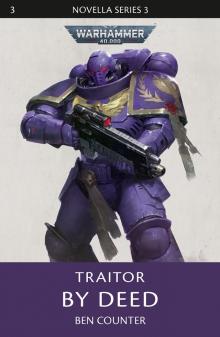 Traitor by Deed
Traitor by Deed Sacrifice
Sacrifice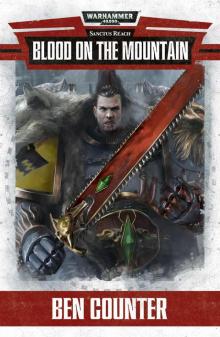 Blood on the Mountain
Blood on the Mountain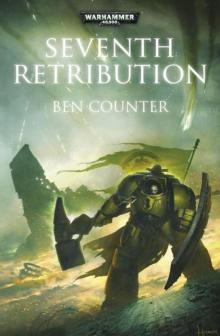 Seventh Retribution
Seventh Retribution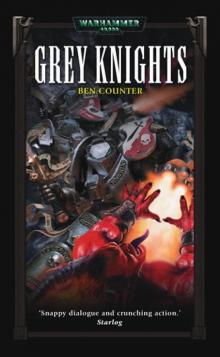 Grey Knights (Warhammer 40000)
Grey Knights (Warhammer 40000)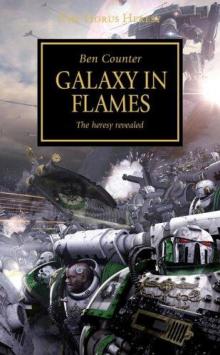 Galaxy in Flames
Galaxy in Flames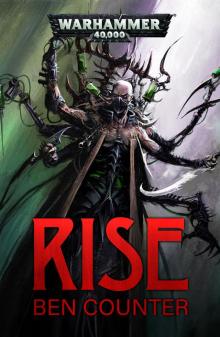 Rise – Ben Counter
Rise – Ben Counter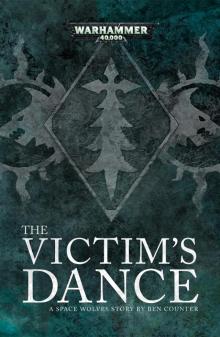 The Victim's Dance
The Victim's Dance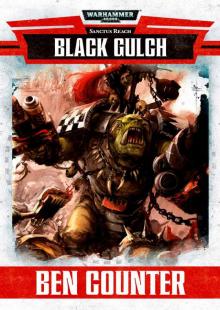 Black Gulch
Black Gulch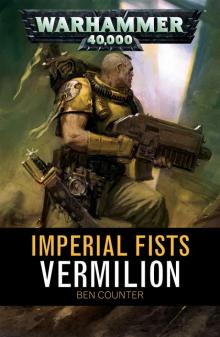 Vermilion
Vermilion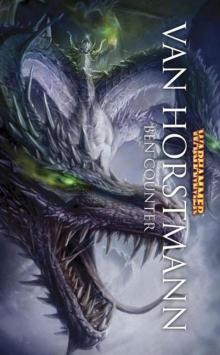 Van Horstmann
Van Horstmann The World Engine
The World Engine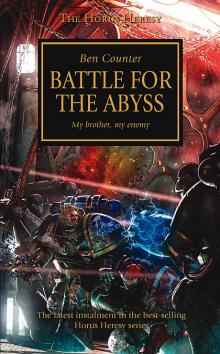 Battle for the Abyss
Battle for the Abyss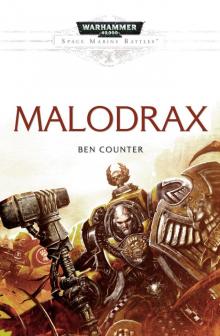 Malodrax
Malodrax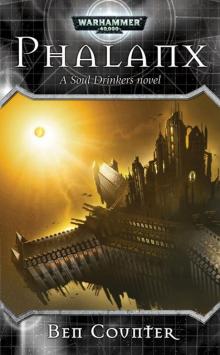 Soul Drinkers 06 - Phalanx
Soul Drinkers 06 - Phalanx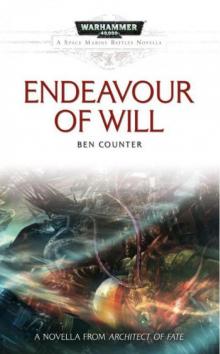 Endeavour of Will
Endeavour of Will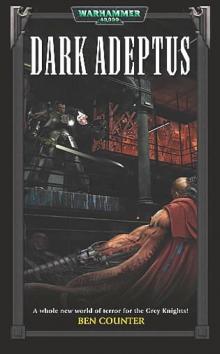 Dark Adeptus
Dark Adeptus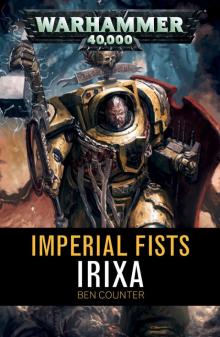 Irixa
Irixa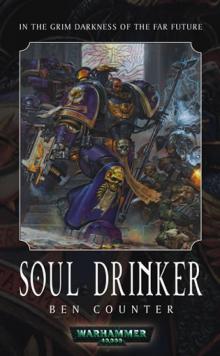 Soul Drinker
Soul Drinker